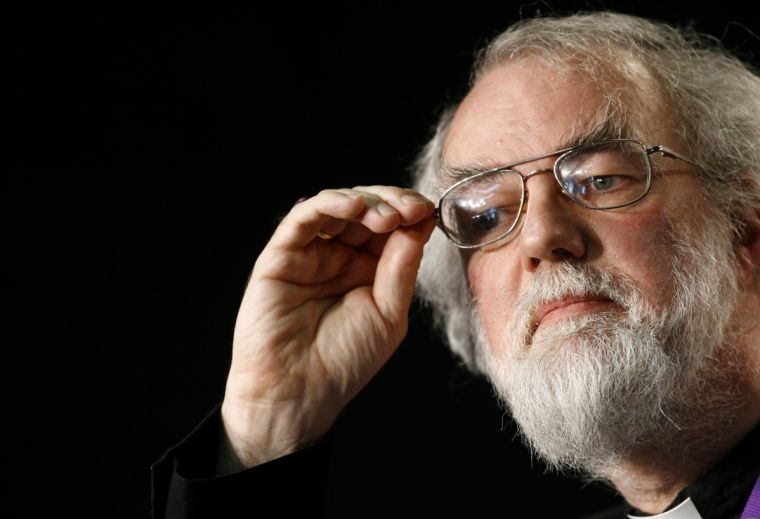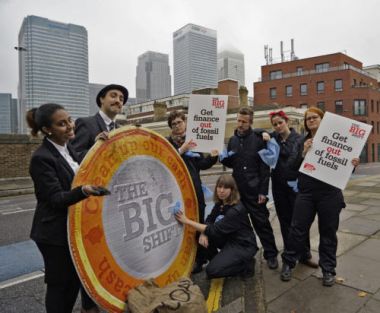Rowan Williams and Christian Aid lead charge against banks who profit from 'climate chaos'
Rowan Williams has urgently questioned the morality of British banks profiting from projects that cause climate change and called for them to shift their investments away from fossil fuels 'that contribute to climate chaos'.
The former Archbishop of Canterbury's comments come as a new ComRes poll shows that 80 per cent of the British public agree that it is morally wrong for banks to profit from investments that pollute the environment. Four in five people (80 per cent) also say they do not want banks to invest their savings in projects that damage the environment, while 77 per cent agree that banks should be stopped from doing so.

Last week Barclays announced profits for the year to September of £3.4bn, up 31 per cent compared to last year. Lloyds announced profits for the same period of £4.5bn, up 38 per cent, while RBS announced a profit of £1.3bn for the same period. HSBC reported profits for the year to date of £11.3bn, a rise of 40 per cent.
Dr Williams, who is chair of Christian Aid, said: 'This year we have seen extreme weather displacing millions of people in South Asia and bringing death and destruction in the Caribbean and the United States. These communities count the cost in lives lost. But British investors, including banks, continue to count profits from just those fossil fuel investments that contribute to climate chaos.
'The latest surveys make it plain that an overwhelming majority of the British public do not want their savings invested in holdings that damage our global future – and that they expect bank CEOs to take personal responsibility for making sure that their investments are ethically and environmentally responsible.
'Our call today is for the chief executives of our major banks to make clear and time-specific commitments to reducing and ultimately replacing fossil fuel investment, and to shift towards climate solutions. The moral case is clear, and the public increasingly recognise this. The urgency is mounting.'
The ComRes polling also found that: 78 per cent agreed that investing in companies which cause dangerous climate change is morally wrong no matter how profitable it is; 81 per cent of people felt bank chief executives should take responsibility for ensuring their banks' investments are not causing environmental damage ,with over 55s the largest group in support of this at 85 per cent; and 85 per cent of people think it is morally wrong to profit from investing in projects which will cause harm to children's futures.
The comments from Dr Williams and the ComRes findings coincide with a new report published by Christian Aid, which shows how the UK's high street banks are profiting from some of the dirtiest fossil fuel projects around the world, while communities in South Asia, the Caribbean and the US are still paying the price for this summer's extreme weather events.
The report, called The Big Shift, contains case studies from Colombia, East Africa and Indonesia and reveals that Barclays, HSBC, Lloyds and RBS are all funding the companies behind the Cerrejón coal mine in Colombia, the coal from which generates nearly the equivalent carbon pollution in a year as Colombia's entire national emissions. This is despite a commitment from the four banks to deliver the Paris Agreement goals of limiting global warming to well below two degrees. Christian Aid said: 'In fact, two years on from Paris, there's been no substantive change in the banks' lending policies or actions.'
Christian Aid's report shows that despite the falling costs of renewables, the world is still investing over three times more in fossil fuels than renewables, and that if this trajectory continues the global economy will have funneled a staggering $23 trillion into fossil fuels by 2050. 'This would sink the Paris Agreement's targets and cause untold misery to people around the world who are suffering from the impacts of climate change, with the poorest already bearing the brunt,' Christian Aid said.

According to the International Energy Agency (IEA), private banks have a key role to play in reversing the needed investment gap and making the shift to renewables. The agency concludes its 2017 World Energy Investment report by saying: 'Investment in new low-carbon generation needs to increase just to keep pace with growth in electricity demand growth, and there is considerable scope for more clean energy innovation spending by governments and, in particular, the private sector.'
The IEA recently released a report showing that renewables will give more people in the developing world access to electricity than coal.
In September, the editor of The Banker Magazine, Brian Caplen, warned that banks faced an existential crisis. 'Under clean-energy scenarios, oil majors become rather less blue-chip to lend to than those engaged in the technologies of the future – for example renewable energy, electric cars and insulation,' he said. 'In these sectors, there are big opportunities with one estimate putting the investment needed to transition to a lower carbon economy at $1000bn each year for the foreseeable future. This figure is not something dreamed up by an idealistically green organisation – it comes from the Financial Stability Board's Task Force on Climate-related Financial Disclosures, chaired by Michael Bloomberg.'
Christiana Figueres, the former General Secretary of the UNFCCC, last month called on banks to invest a ratio of 2:1 in favour of green investments over brown investments to avoid an economic cliff edge.
The Archbishop of Cape Town, Thabo Makgoba, who leads the Province of Southern Africa which recently decided to divest all its fossil fuel investments on climate change grounds, responded to the Christian Aid report by saying: 'Climate change is hurting people in the developing world first and worst. In response to this we are divesting from fossil fuels and can no longer profit from pollution. But in Britain UK banks are still propping up coal mines which are driving the climate change we suffer from. This is morally questionable and they have a responsibility to clean up their act.'
Christian Aid said that as part of its 'Big Shift' campaign more than 25,000 contacts have been made with the CEOs of the big four high street banks asking them to move their investments out of fossil fuels. To sign up to the campaign visit www.christianaid.org.uk/bigshift.
Watch Christian Aid's spoof bank TV advertisement:











